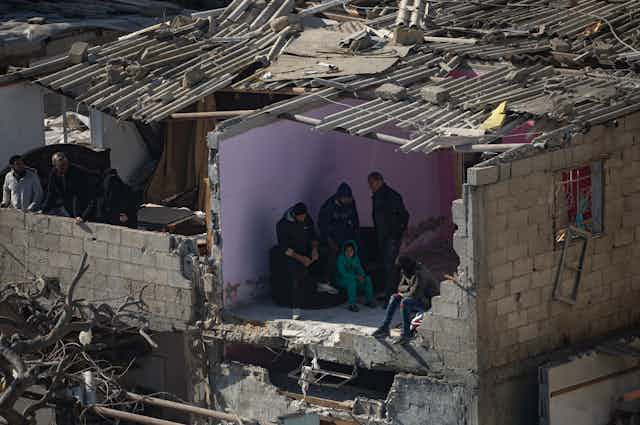Joe Biden’s most senior Middle East adviser, Brett McGurk, has arrived in Israel to push for a deal to halt the war in Gaza and secure the release of Israeli hostages held by Hamas. McGurk has served each successive president since joining George W. Bush’s national security team in 2005, and his presence in the region at this increasingly crucial time, as Israel prepares for a ground assault on the overcrowded southern Gaza city of Rafah, is an indication of the urgency with which the Biden administration views the situation.
Thus far, intransigence on both sides has scuppered various initiatives aimed at securing a ceasefire. Last week, after Benjamin Netanyahu pulled Israeli negotiators out of talks in Egypt, blaming Hamas for refusing to budge on what he called its “ludicrous” demands, Israel’s prime minister pledged to press ahead with the Rafah offensive. However, his war cabinet member Benny Gantz said this week that a deal might still be possible.
Failing that, the prospect of an all-out assault on Rafah, where more than a million Palestinians from across the Gaza Strip have taken refuge, on March 10 – the start of Ramadan – is very real. Casualties are likely to be enormous, unless people are given somewhere to escape to.
Biden has repeatedly urged Netanyahu to rethink the assault on Rafah, calling for a “credible and executable plan” for protecting and supporting the Palestinians sheltering there. And as Paul Rogers, an internationally respected expert in Middle East security issues at the University of Bradford, notes, there is a precedent.
In 1982, during the war between Israel and Lebanon, the then-US president Ronald Reagan telephoned Israeli prime minister Menachem Begin to demand he call off the 11-hour bombardment of West Beirut, where thousands of fighters from the Palestinian Liberation Organisation were sheltering. “Menachem, this is a holocaust,” Reagan is reported to have said. Begin duly called off his bombers.

Rogers highlights the long and close association between the Pentagon and the Israel Defense Forces (IDF). In a country where pretty much anyone who is anyone has served in Israel’s military, this counts for a lot. Perhaps, he writes, the IDF could put extra pressure on Netanyahu to reconsider.
Read more: Gaza war: will Israel respond to US pressure to tread carefully in Rafah? There is a precedent
Meanwhile, satellite images and video footage have revealed that Egypt is building what appears to be a large concrete enclosure on its side of the Rafah crossing. Analysts believe this is being prepared as a contingency for dealing with what could be hundreds of thousands of displaced persons pushed out of Gaza into the Sinai peninsula.

Gaza Update is available as a fortnightly email newsletter. Click here to get our updates directly in your inbox.
Gillian Kennedy, an Egypt specialist at the University of Southampton, has been considering what such an exodus would mean for Egypt’s strongman president, Abdel Fattah al-Sisi.
Sisi is not popular at home. He may have won an election last year with 89% of the vote, but given the lack of opposition candidates, this was hardly surprising. Egypt’s economy is in a parlous state, with rampant inflation and stubbornly high unemployment, so having to host a huge influx of refugees is not something Sisi will be anticipating with much relish.
And the close relations between supporters of Hamas and Egypt’s Muslim Brotherhood – Sisi’s implacable foes – make this prospect all the more unpalatable, Kennedy concludes.
Read more: As Israel's assault on Rafah approaches, Egypt prepares for a flood of Palestinian refugees
Grim in Gaza
For Palestinians trapped in Gaza, meanwhile, there is the spectre of starvation. The world’s major authority on food insecurity, the IPC Famine Review Committee, estimates that 90% of Gazans are facing acute food insecurity.
Yara M. Asi, a food security expert at the University of Central Florida, writes that people are resorting to eating cattle feed and grass. They are hunting cats for food. And things are likely to get worse, Asi observes. The UN agency responsible for coordinating aid in Gaza, the UN Relief and Works Agency for Palestine Refugees (UNRWA), says it will have to cease operations in March after many of its funders withdrew over Israeli allegations that UNRWA staff had taken part in the October 7 Hamas attacks.
And, making matters worse, Israeli bombing has destroyed bakeries, food production facilities and grocery stores. It is now estimated that, of the people facing imminent starvation in the world today, 95% are in Gaza.
Of course, food production facilities and shops aren’t the only things that have been reduced to rubble by the IDF during its relentless four-month assault. For decades, the people of Gaza had become used to a cycle of destruction and rebuilding writes Yousif Al-Daffaie, a researcher in the field of cultural heritage and post-war countries at Nottingham Trent University. But this time around, the devastation has been so complete that there is almost nothing left to rebuild.
Most importantly for the soul of Gaza, nearly 200 sites of cultural importance have been wrecked, including an ancient harbour dating back to 800BC, a mosque that was home to rare manuscripts, and one of the world’s oldest Christian monasteries. This act of what Al-Daffaie calls “urbicide” includes Palestine Square in Gaza City, a popular meeting place, and Gaza’s only public library on Omar Al-Mukhtar Street, one of Gaza City’s two main streets, which has been totally destroyed.
Read more: The destruction of Gazaʼs historic buildings is an act of 'urbicide'
Israel: hurt, angry and isolated
All the while, the world is watching. What has become clear since the vicious Hamas attack on October 7 sparked Israel’s brutal military response is the massive disconnect between how most Israelis and much of the rest of the world see this current episode.
Eyal Mayroz, a senior lecturer in Peace and Conflict Studies at the University of Sydney, says that while the outside world sees daily reports of death and suffering in Gaza, in Israel much of the media remains focused on the pain of the attack by Hamas and the plight of the 130 remaining hostages and their families.
Ilan Zvi Baron of Durham University and Ilai Z. Saltzman of the University of Maryland highlight the pain and anger of most Israelis since October 7. They write that the reaction of some on the progressive left, some of whom celebrated the Hamas attack as an act of anti-colonial resistance, is not understood in Israel. This, they say, is a problem for Israel’s peace movement, which now feels more isolated than ever and unable to pressure their government to work harder for a peaceful solution.
Read more: Gaza war: blaming Israel for October 7 Hamas attack makes peace less – not more – likely
Listen up: peace polling
Finally, regular readers may recall an article we published by Colin Irwin, a researcher at the University of Liverpool whose work with “peace polling” played a key role in the negotiations which led to the 1998 Good Friday peace agreement in Northern Ireland. Irwin noted that he was set to reprise his role when Barack Obama won the US presidency in 2008, but a lack of political will and Netanyahu’s refusal to include Hamas put paid to any chance of peace talks succeeding at that stage.
In this week’s episode of The Conversation Weekly podcast, Irwin explains how peace polling emerged from his work among Canada’s Inuit minority, and has been used from Sri Lanka to Cyprus.
Read more: Israel-Gaza: how opinion polls used in Northern Ireland could pave a way to peace
Gaza Update is available as a fortnightly email newsletter. Click here to get our updates directly in your inbox.

